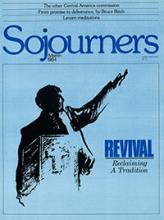For Israel's historians and poets, Israel as a people came to birth in the experience of God delivering them from bondage in Egypt. These Exodus events, beginning with the call of Moses (Exodus 3) and culminating with the deliverance at the sea (Exodus 14-15), were the central salvation events of Israel's faith. Exodus revealed a pattern of God's grace which is experienced in other settings and times, and is remembered in Israel's worship.
Yet, if Exodus is at the center of Israel's faith identity, it is not entirely without preparation. The stories of God's promise to Abraham and the lives of Israel's ancestors lived in relation to that promise are found in Genesis 12-50 and form an important prologue to the beginning of the salvation history in Exodus. In these stories peoplehood is promised but not yet realized. In fact, it is only as Israel's storytellers looked back from the promised land that those stories of the promise were fully understood.
The Call to Sojourn
After chronicling the growth of sin and alienation in all humankind (Genesis 3-11), the biblical story abruptly shifts to the call of a particular man and woman from whom a whole people will come. The biblical writers understood the story of Abraham and Sarah to be the beginning of the story of Israel, whom God has called into existence to be an instrument of grace in this sinful and broken world. It is a story which begins with a calling and a promise.
In Genesis 12:1 God calls Abram (his name is later expanded to Abraham) to leave "your country and your kindred and your father's house." God summons Abram to radical separation from those things that usually made for security in biblical times: land, family, and inheritance (the word house here means household in the sense of all of a family's retainers and goods).
Read the Full Article

